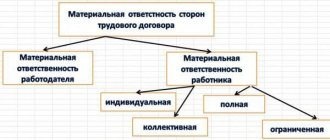Professional standard No. 309
Professional standard No. 309 was approved by order of the Ministry of Labor of the Russian Federation dated February 21, 2019 No. 103n.
The standard contains requirements for the qualifications of accountants and chief accountants. The requirements are ranked by skill level in accordance with the growth of functionality and responsibility of decisions made by the employee. IMPORTANT! Qualification levels for professional standards were approved by Order of the Ministry of Labor dated April 12, 2013 No. 148n. The level is assigned depending on the tasks performed, the degree of responsibility, as well as the need to set tasks and monitor the progress of their implementation by other employees.
There are nine levels in total. However, for standards requiring high professionalism, such as No. 309, levels of 5 and above apply:
- Level 5 implies that the employee independently makes most of the work decisions on assigned tasks, participates in decision-making for the entire department, and is responsible for the results of his and his department’s activities.
- Level 6 implies that the employee not only makes decisions, but also determines tasks based on the goals of the unit and the entire organization. Assigns these tasks to other employees (subordinates) and is responsible at the level of the unit and the entire organization.
- The 7th level assumes that the employee makes decisions at the organizational level: develops a strategy, sets goals with which they work at the 6th and 5th levels, develops a methodology and organizes business processes. In addition, he has responsibilities at the senior management level.
Key aspects for an accountant
As noted above, the professional standard for an accountant separates the requirements for an accountant and a chief accountant.
For an ordinary accountant, the standard provides the following typical functionality:
- working with primary documents (including receiving and checking incoming documents and creating outgoing documents);
You will learn more about primary documents from the article “Unified forms of primary documents (list)”.
- entering information on processed documents into the organization’s accounting registers;
- consolidation, control and closure of data according to the registers of your site (or sites).
For more information about accounting registers, see the articles:
- “Accounting registers (forms, samples)”;
- “How to maintain tax registers (sample).”
The required level of qualification requirements is 5th.
The employee must have secondary vocational education or additional vocational education plus suitable work experience. Moreover, if an accountant with level 5 qualification requirements does not hold a position with a category (the standard provides for accountant positions without a category, categories I and II), then there are no requirements for work experience. And if he does, that is, at least one year in a position with a lower (previous category). In addition, he must be able to apply his knowledge in practice. And also independently find and use information about the application, changes, additions of standards and methodologies.
The qualification requirements in this case are not strict. The employer, at his discretion, can, for example, hire an employee without work experience if he is convinced that he can cope with the responsibilities assigned to him.
Why is a job description required for a deputy chief accountant?
The document provides clear language for a specialist on the main aspects of business relationships. So, it states:
- required skills;
- education and work experience requirements;
- job responsibilities;
- rights and responsibilities;
- other key aspects.
All this helps to orient the deputy chief accountant: what the manager expects from him and what his role is in the company. The company's management, in turn, with the help of this instruction, can simplify the processes of monitoring the employee and improve the efficiency of his work processes. Additionally, the document makes it possible to prevent conflict situations at work and can also be used in legal proceedings.
Key aspects for the chief accountant
The requirements for a chief accountant in the current professional standard can be divided into several levels.
Firstly, there are three qualification levels for the chief accountant - 6th, 7th and 8th. Secondly, within each of the relevant ones there may be requirements:
- to simply the chief accountant (for organizations not specifically named in the legislation);
- the chief accountant who meets the requirements of certain legal norms - for example, the provisions of Part 4 of Art. 7 of Law No. 402-FZ (for JSCs, pension, investment, mutual funds, government agencies).
In the professional accountant standard, the functionality for chief accountants with the 6th qualification level is represented by four sections (labor functions):
- Preparation of accounting (financial) statements.
- Internal control of accounting and reporting.
- Tax accounting, preparation of calculations and declarations, planning.
- Conducting financial analysis, budgeting, cash flow management.
In turn, an accountant with level 7 qualifications has a slightly different list of job functions. It includes features such as:
- Organization of accounting in economic entities with separate divisions.
- Organization of preparation and submission of reports by economic entities with separate divisions.
A chief accountant with the 8th qualification level can perform the following job functions:
- Managing the process of methodological support for the preparation of consolidated reporting for a group of companies.
- Management of the process of preparation and presentation of consolidated financial statements.
Other responsibilities may be included in the chief accountant's job description. For example, maintaining personnel records if a small organization does not have a separate personnel department.
To perform the basic functionality of a chief accountant as specified in the professional standard, an accountant therefore needs level 6 professional qualifications.
To comply with professional standards for accountants in 2022, a chief accountant of the 6th qualification level must have:
- higher education (bachelor's degree) or non-core higher education and additional education within the framework of vocational training programs;
- secondary education, supplemented by training programs for mid-level specialists;
- non-core secondary education, supplemented by relevant specialist training programs and additional education within the framework of vocational training programs.
In addition, there are requirements for work experience at the 6th qualification level:
- at least 5 years with higher education;
- at least 7 years with secondary vocational education.
In turn, level 7 will be needed for positions related, for example, to accounting, control and financial management of large companies and holding structures.
In addition to knowledge of the legislative and methodological aspects of accounting and tax accounting, the standard imposes additional requirements on chief accountants, for example:
- ability to lead people;
- computer literacy;
- knowledge of special programs;
- knowledge of methods and techniques of analysis, etc.
Note that the standard contains three not entirely correct aspects:
- Tax reporting is combined with others into a single concept “financial reporting”. According to some analysts, such a combination is not entirely legal, since in their meaning financial reporting (for interested private users) and tax reporting (for tax authorities) are not identical. Accordingly, their composition is different functions.
- Internal control under current legislation is carried out only by organizations subject to mandatory audit. That is, the requirement for this does not apply to everyone. Accordingly, the labor function of internal control is selective (not for everyone). By the way, there is a separate professional standard “Internal Auditor”, approved by order of the Ministry of Labor and Social Protection of Russia dated June 24, 2015 No. 398n. The specifics of the relevant labor function can be found on the basis of the provisions of this document.
- In the description of labor functions in the professional standard, accounting is formally separated from reporting, while in Art. 6 of Law No. 402-FZ directly states that accounting includes both preparation and submission of reports.
Based on the foregoing, it can be assumed that professional standards for accountants in 2022 have signs of regulations that are not entirely logically formed and complete. And it is possible that they will be adjusted in the future.
How to draw up an employment contract with an accountant taking into account professional standards? Sign up for a free trial access to ConsultantPlus and an employment contract, which takes into account the labor functions of an accountant in accordance with the professional standard.
Principles of job description
Labor legislation still does not pay attention to describing the role of the job description. As a result, employers adapt the document to their needs, however, adhering to some common standards. According to these standards, standard instructions include the following sections:
- General provisions.
- Functions.
- Rights.
- Responsibility.
Employers can add additional ones to these sections, which specify individual aspects of the specialist’s activities. The most popular additional parts are:
- Working conditions.
- Official connections.
- Criteria for assessing a specialist.
- Qualification requirements.
Important! To create or adjust a job description, you can use accounting professional standard No. 103n, approved by the Ministry of Labor at the beginning of this year.
General provisions
The initial section in the instructions. It is intended to list the general principles of the specialist’s position in the company. The standard items in the section are those that show who replaces the specialist, who hires him and fires him, and the like.
The most important points are those that list the requirements for the candidate’s experience and education for the position, as well as the skills that he must possess.
Important! The deputy chief accountant must replace his supervisor if necessary. This places increased demands on the level of specialist. In this case, you can even allocate a separate section for qualification requirements.
Main functions
The section describes the main responsibilities of the deputy chief accountant. In addition to assisting the chief accountant, his functions may also include operational management of some area of accounting, such as IFRS reporting or tax planning. In this case, it is recommended to register these functions separately.
Responsibility
The section is reserved for listing cases when a specialist can be held accountable. It is important for the deputy chief accountant to mention the responsibility for disclosing confidential internal information.
Important! The measures of liability are described in general terms, since they can be specifically determined only during the relevant proceedings, including in court.
Rights
Here is a typical list of rights, approximately the same for different specialists. For an accountant, it is important to emphasize the right to receive documents and information necessary for maintaining reports, submitting them and checking their correctness.
Working conditions
This includes not only standard rights, such as benefits and bonuses, but also those related to the specifics of accounting work. Thus, an employer may undertake to provide a specialist with industry press and access to specialized online resources. A specialist can also be sent on paid trips to industry conferences or professional development seminars.
For the instruction to come into force, it must be agreed upon with the head of the company and the chief accountant. Other persons may also be involved in the approval (deputy director, lawyer, head of the personnel department). After this, the employee himself must be familiar with the contents of the instructions.
The instructions are printed on letterhead. This form must contain the signatures of the persons involved, their transcript, the name of the organization itself and the date of compilation. Only after all signatures have been delivered is the document considered to come into force.
When a professional standard is mandatory for use under current legislation
The obligation to apply the professional standard is currently regulated by clause 4 of Art. 7 of Law No. 402-FZ. According to the content of the article, admission to the duties of a chief accountant in structures whose securities are traded in organized trading, as well as in bodies managing state extra-budgetary funds, is standardized.
The article contains a note: with the exception of credit institutions. However, this is only because persons are appointed to senior positions in banking structures in accordance with the requirements of the Federal Law “On Banks and Banking Activities” dated December 2, 1990 No. 395-I. These requirements are even somewhat stricter and more extensive than those set out in Art. 7 of Law No. 402-FZ.
Other employers still have some freedom in choosing and appointing a chief accountant. Although it is possible that the use of professional standardization will change the situation.
Read more about this in the article “Introducing professional standards in 2021.”






